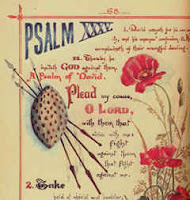 King's Cross Station in London, more famously known these days as "Platform 9-3/4" for the Hogwarts Express in Harry Potter,* now has a better king for a namesake. Thanks to Tim Keller's new book King's Cross...the Story of the World in the Life of Jesus, the lazy and often rebellious George IV - that most unpopular English monarch during the American Revolution (and for whom the station was later named) - can pass the mantle of honor to a far more glorious King.
King's Cross Station in London, more famously known these days as "Platform 9-3/4" for the Hogwarts Express in Harry Potter,* now has a better king for a namesake. Thanks to Tim Keller's new book King's Cross...the Story of the World in the Life of Jesus, the lazy and often rebellious George IV - that most unpopular English monarch during the American Revolution (and for whom the station was later named) - can pass the mantle of honor to a far more glorious King.The symbolism behind the title is appropriate. For as Potter pictures so well, train stations represent departures to new vistas and experiences, never-before-seen countries, and quite possibly, a whole new perspective on life. Can books do the same? Yes, especially those that so helpfully expound on the life of Jesus and how He loved. Why? Because it's in gazing at Jesus that we are transformed (see 2 Cor. 3, esp. v.18).
Great for believers and inquiring skeptics alike, King's Cross is essentially a collection of Keller's musings, study, and preaching through the Gospel of Mark at Redeemer Church, NYC. It's also my favorite book of late because it's so good on how Jesus is always going deeper, past the rules and trappings of the "outward appearance" (where we and our culture so often live), to the heart - a vital aspect of counseling. Mark is also the shortest of the Gospels on the life of Jesus, which is especially attractive for a quick-read. Having Keller (who has been called by some "the C.S. Lewis of the twenty-first century") as a guide to understanding what Jesus is up to in some key passages is a great asset.
To whet your appetite, here's a sample "story" about our hearts and Jesus that Keller relates in chapter 3, The Healing. It involves the experience of Cynthia Heimel, a columnist who wrote an article for the Village Voice from which Keller quotes. (Keller is commenting on the healing of the paralyzed man in Mark 2:1-5, and the oft-debated and perplexing question of why Jesus addressed his heart (and greatest need) first:"Over the years she (Cynthia) had known a number of people who were struggling actors and actresses, working in restaurants and punching tickets at theaters to pay their bills, and then they became famous. When they were struggling like all of us, they said, "If only I could make it in the business, if only I had this or that, I'd be happy." They were like so many other people: stressed, driven, easily upset. But when they actually got the fame they'd been longing for, Heimel said, they became insufferable: unstable, angry, and manic. Not just arrogant, as you might expect-worse than that. They were now unhappier than they used to be. She said,
I pity [celebrities]. No, I do. [Celebrities] were once perfectly pleasant human beings...but now...their wrath is awful....More than any of us, they wanted fame....They worked, they pushed....the morning after....each of them became famous, they wanted to take an overdose....because that giant thing they were striving for, that fame thing that was going to make everything okay, that was going to make their lives bearable, that was going to provide them with personal fulfillment and....happiness, had happened. And nothing changed. They were still them. The disillusionment turned them howling and insufferable.
(Keller continues)..."Then Heimel added a statement that took my breath away: "I think when God wants to play a really rotten practical joke on you, He grants you your deepest wish." You know what Jesus is saying to the paralyzed man? I'm not going to play that rotten joke on you. I'm not going to just heal your body, and let you think you've gotten your deepest wish."If you know the story, Jesus will go on to heal the man (in this case) - but only after telling him "Your sins are forgiven." Would you think this harsh if you were there? Wouldn't you want Jesus to do the obvious, and immediately heal the man who was lowered through a roof (!) to get to Jesus? Jesus is intent on going deeper. It's not that the body doesn't matter - it does, tremendously. The resurrection makes this clear. But Jesus shows the man (and the millions who would read his story through the centuries) that we really don't go deep enough in analyzing our longings, and identifying our greatest need. For to be granted our greatest desire - without Jesus as Savior and King, (whether it be better health, more money, or as with Heimel's celebrity friends, fame) - is to insure that we won't enjoy lasting fulfillment. As Keller says, Jesus loves us too much to play that bad joke.
So let me encourage you to do something really good for your heart. Take one chapter of King's Cross each night, before bed. It may be that you'll find yourself on a train to a whole new world.*see my August 1, 2011 article A Conversation with Harry


